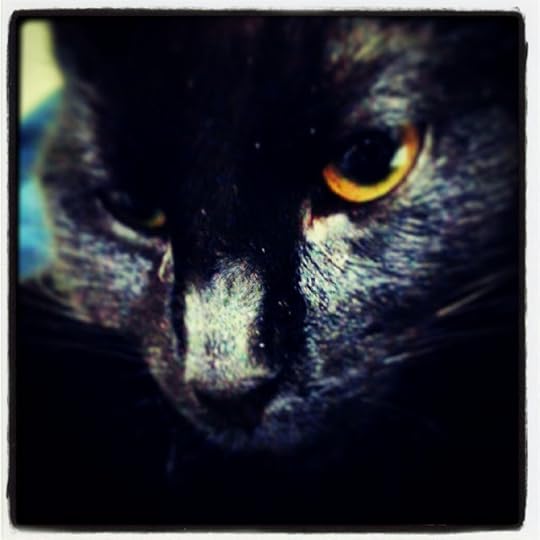Philip Jenks's Blog: This Sunday @ Myopic Books/Simone Muench, Philip Jenks, & Patrick Culliton
July 9, 2013
There are ends of things. It's been weeks, bu...
There are ends of things. It's been weeks, but feels as years Michael. I tried so hard. Just keep you alive. Go. You were the most generous and one of the greatest souls I've known. Someone asked me what made me think of you, like triggers. I said stereo, sobriety, books, computers, and cats. That sums it up. Im going to be the man you'd want me to be. God I miss you my friend.
July 7, 2013
Open house & the foreclosure crisis
Any house whabvtt can be inhabited strikes harm.es and arms The loose way we treat every Single Signaling insect, moral disapprob- [atom] notion N
ation. shelf life. M not real. UR not real.
LOCALLY. a stuffed imitation bobolink replete with recorded code s song inside. It's also a cat toy if you are a person thinking about cat perspective in this house. Alternately, it could have to do with his obsessive Dickinson, a tribute in a windowsill after the War, after his g fathers work on Manhattan project underneath uc football? After gma worked as a hotel manager before the bombs. Holocaust. KoreanVietnamDirty Warsinochet SOA. chirp Corp. Chirp chirp. His little radio he made with day. So something revolting.
masht potatoes are 7.99 hot @whole foods. ("If these are organic what are the other potatoes? ")
After Wolf 1, 2, and 3 but before Shulie died. A and the strings could be "cat toys" (see above) or as in string of institutions, in peaces all over the house. Chirpchirp.
June 30, 2013
PUSCIFER - A Bohemian Rhapsody
March 22, 2013
Animal Rights and the Crisis of the American Republic
Her work does the work of bringing being back into the discussion. As Mackinnon wrote in "Of Mice and Men", Why is being not enough? Why do you have to suffer? To elaborate,
" Predicating animal rights on the ability to suffer is less likely to fall into this trap, as it leads more directly to a strategy for all. Indeed, capacity to suffer may be closer to women’s bottom line than liberal legal approaches to women’s rights have yet reached. But women’s suffering, particularly in sexual forms, has not delivered us full human status by law. It has gotten us more suffering. That women feel, including pain, has been part of stigmatizing them, emotions in particular traditionally having been relegated to the lower, animal, bodily side of the mind-body split. What will it do for animals to show that they feel? Calculations of comparative suffering weighted by status rankings, combined with the inability to register suffering on the sufferer’s terms, have vitiated the contribution Bentham’s recognition might make. The ways women suffer as women have been denigrated and denied, and when recognized more often used to see us as damaged goods than as humans harmed. Fundamentally, why is just existing, being alive, not enough? Why do you have to hurt? Men as such never had to hurt or to suffer to have their existence validated and their harms be seen as real. It is because they are seen as valid and real to begin with that their suffering registers and they have rights against its harm.Women have been animalized, animals feminized, often at the same time. If qualified entrance into the human race on male terms has done little for women— granted, we are not eaten, but then that is not our inequality problem— how much will being seen as humanlike, but not fully so, do for other animals? What law resists doing is taking anything they want away from those at the top of hierarchies. It resists effectively addressing the inequality’s material bottom line." (Mackinnon 271 in Sunstein and Nussbaum.)
The law exists addressing inequality's material bottom line. Thus, "The good intentions of the powerful, far from saving the powerless, doom them. Unless you change the structure of the power you exercise, that you mean well may not save those you love. Animal rights advocates take note" (Mackinnon 272). Thus, she calls for a materialist restructuring of the bottom line of power relations. Adjustments to the law as it currently stands may assist those elite few, but it will not in the end provide the fundamental changes necessary.
Being alive is enough. You are, we are, all are valid to begin with and this is ontologically grounded in our birth into and within this world. No being should suffer endless torment so a man can shave or greedily engorge his face with flesh. But there is more to this problem. Much more, and perhaps this is what I find compelling about the intersectionality Mackinnon introduces here. The material relations of production, which really have been a grounding point for the ascension of a certain type of torment, a new world torment, drive the analysis. The law exists not as a corrective measure to assist us in great times of need when no one else will. Sure, we are better off with rights than without. And that's that. Rights are here. However, I'm looking toward the intricate economies of America's food/poverty production system working in tandem with the society of the spectacle (replete with its culture industry of advertising - there is something peculiar about McDonald's being based here so near Chicago, and Except, in a liberal democratic republic, there is some dim assertion of life, liberty, and the pursuit of happiness. Just by being! The way these characteristics have been institutionally carved out is through a procedural solution. The legislation, execution and evaluation of said principles will ensure that, for each and every. Our procedural republic relies all too often on the legislation of fundamental change. And the separation of the we, which is always only people, into categories of work, ideology, favorite teams, ad nauseum - a spearing of commonality, of being that comes with the industrial and postindustrial political economy - has evacuated the Commons. It's insufficient and oversimplified to suggest capital has ruined community and eviscerated compassion and mercy. While a start, there is more to restructuring power than a pure attention to the material relations of power and mode of production.
Mackinnon, much like Hannah Arendt in this limited regard, has an appreciation for and healthy fear of the role of love in societal relations. While we may find the generative power of love (e.g. Love and Saint Augustine), there are the horrors it may produce - including its intimacy with pity (e.g. The Terror). But some revisiting of compassion, love, and the sensus communis - our common sense(s) is necessary to jolt us out of our collective sleep and awaken some awareness of the contradictory consciousness that haunts the very institutions we seek to represent the best in us. They are lying. And we are as well. We are as well. Usually, doing the right thing is pretty easy to figure. Skinning a living fox to generate useless trophies of selfish consumption is not right. Perhaps doing the right thing, that is far more difficult - and everything within a system based on oppression of beings, human and nonhuman. Am I worth the task today of doing my best? What God would love me for running a slaughterhouse?
March 15, 2013
those other people
those other people
just like you, I have often thought myself the victim of what other people say and do. Yet, every time I confessed the sins of such people, especially those whose sins did not correspond exactly with my own, I found that I only increased the total damage. My own resentment, my self-pity would often render me well nigh useless to anybody.
So, nowadays, if anyone talks of me so as to hurt, I first ask myself if there is any truth at all in what they say. If there is none, I try to remember that I too have had my periods of speaking bitterly of others; that hurtful gossip is but a symptom of our remaining emotional illness; and consequently that I must never be angry at the unreasonableness of sick people.
Under very trying conditions I have had, again and again, to forgive others - also myself. Have you recently tried this?
March 11, 2013
Best Feeling in some Time
Watch "Daniel Johnston Life in Vain - Psychiatric Horror- Doctors Kill" on YouTubedidn't think this v was going v to happen. Johnston blows my mind and gives hope against all odds. I'm proud to be a survivor... just top be alive. No shame in disability. No excuses either. Just do all I can to help others. Thank you too hbo girls ON ALL FOURS for getting more real. To the root of our vulnerabilities.
February 26, 2013
Thief
September 23, 2012
the saddest thing
if you're Crazy and you know it
Block your friends!
If you're crazy and you know it,
Block your friends!
If you're crazy and you know it
and you really wanna show it
If you're crazy and you know it,
block your friends.
YAY!
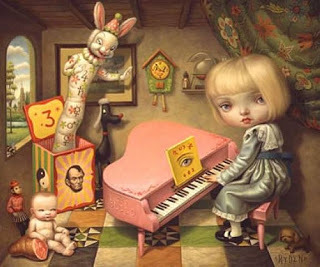
July 30, 2012
Chick-fil-A "Controversy" and the Problem of The Unencumbered Self (Or how free speech incinerates the planet)
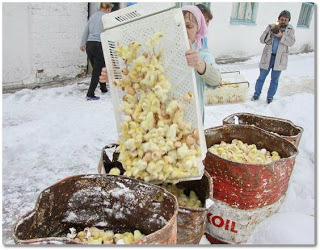
The principle of might makes right (for this is not about food or health, clearly) is the foundation of factory farm industries. Exploitation of innocents is the key. what historical amnesia, to return blindly to fakery of a new "gilded age" and forget the lessons of the 20th century. As Isaac Bashevis Singer stated, "In relation to [animals], all people are Nazis; for the animals, it is an eternal Treblinka." Or, more accurately, when it came to building concentration camps, Germans visited Chicago - as Coetzee notes, "'...it was from the Chicago stockyards that the Nazis learned how to process bodies."

All beings capable of suffering deserve compassion and full equality. The problem is not with the "right/conservative" versus the "left/liberal" for both are merely rearranging the same.
This might seem to be merely redundant of say, the claims R. Clarke Cooper makes (or aligned with) in "Chick-fil-A: Empty Calorie Diversion from Diversity" in Huff Post. Nothing could be further from the truth. Cooper realigns the debate as empty not because the fundamental matter lies within speciesism (the foundation of bigotry and true state-sponsored environmental terrorism), but rather because it is trivial, "In a free society there is room for disagreement on marriage, as there is room for disagreement on war, health care and taxes. Remember, this is about fried chicken, not cross burnings." So, for Cooper 1) there's a free/open/civil society; 2) this free/open/civil society functions out of healthy debate and then produces great policies (see Sandel's critique below) and a fully functioning diverse democracy thrives on this; and pointedly, 3) "this is about fried chicken, not cross burnings." True, factory farming is a leading (second, by most accounts) contributor to climate change in the world (not cross burnings, not to trivialize the latter but it simply is not about that).
And so it is with the return of the unencumbered self (did it ever take leave?). Or as Herbert G. Reid accurately deemed (presciently long before facebook etc) "the cyberspace cowboy." Faux leftism, liberal feminism (which runs the gamut from m albright to libertarian "postpost feminism" of the united states. I can do what I want! I have the power! etc. This imperialistic internalized patriarchy finds its manifest in Capitalism. Spectres of Marx seems prescient as well. Perhaps derrida's LEAST dated book, most significant (another conversation).
Working living suffering beings, all. This much I've learned in these cold years" (spicer, imaginary elegies). Or as Upton Sinclair (I'm going on memory here) stated in the original 1905 (soon to be censored) edition of The Jungle (note the later editions never explained to the reader what "the jungle" was), " "The place which is here called The Jungle is not Packington, nor is it Chicago, nor is it Illinois, nor is it the United states- it is Civilization." Again, the principle of might makes right. Of doing what one wants. It's only fried chicken. It's only rape culture. It's only free speech. It's only someone's opinion. You're too sensitive. That's "identity politics" (a new charge from the patriarchal capitalist "left"....
Internetted masturbation scenarios (facebook, "twitter"). And, as derrida points out in his section on Kierkegaard in The Gift of Death , there is but a small difference between Killing and Allowing To Die. Small to none. Look at the next post. Post a pic. Smile. It's only fried chicken...
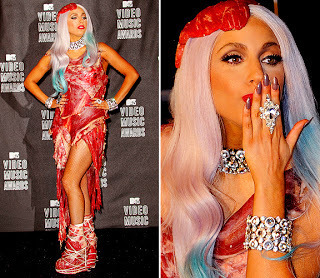
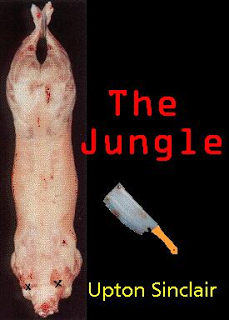

This Sunday @ Myopic Books/Simone Muench, Philip Jenks, & Patrick Culliton
Myopic Books in Chicago — Sundays at 7:00 / 1564 N. Milwaukee Avenue, 2nd Floor
http://www.myopicbookstore.com/poetry.. THE MYOPIC POETRY SERIES — a weekly series of readings and occasional poets' talks
Myopic Books in Chicago — Sundays at 7:00 / 1564 N. Milwaukee Avenue, 2nd Floor
http://www.myopicbookstore.com/poetry...
Sunday, June 21 – Simone Muench, Philip Jenks, & Patrick Culliton
Philip Jenks will read with Simone Muench from their new collaborative chapbook, "Little Visceral Carnival" (Cinematheque Press, 2009) at Myopic. Patrick Culliton, amazing poet, will read his splendid work as well. ...more
- Philip Jenks's profile
- 13 followers


